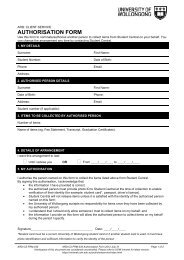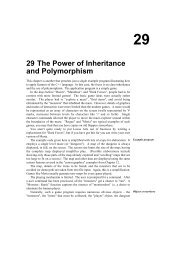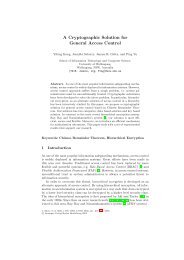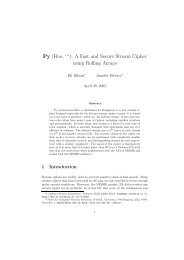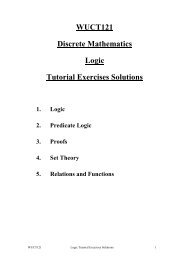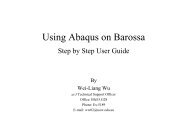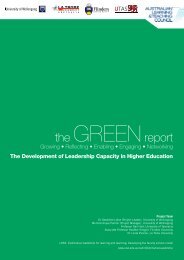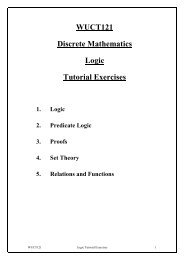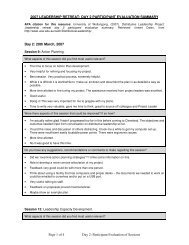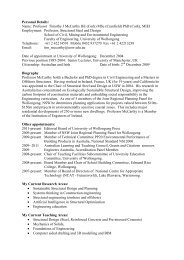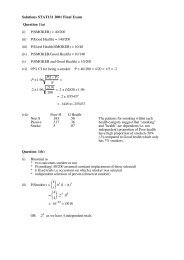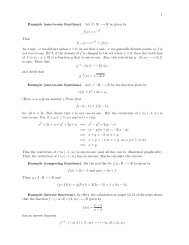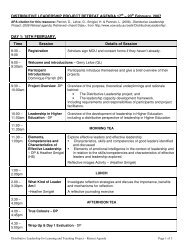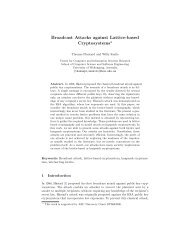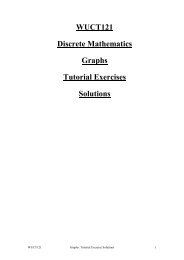india author m 1- a-nan - University of Wollongong
india author m 1- a-nan - University of Wollongong
india author m 1- a-nan - University of Wollongong
Create successful ePaper yourself
Turn your PDF publications into a flip-book with our unique Google optimized e-Paper software.
Dust with Markandaya's Possession. The bibliography lists critical articles on Jhabvala and<br />
Markandaya.<br />
CHADHA, RAMESH. "Cross-Cultural Interaction in Markandaya's Pleasure City." The<br />
New Indian Novel in Enelish, edited by Viney Kirpal (New Delhi: Allied Publishers, 1990):<br />
57-64.<br />
Cross-Cultural interaction is the major theme <strong>of</strong> the novel, and the novelist reveals her<br />
absolute integrity as an artist by not taking sides. Markandaya employs a new style and<br />
narrative technique, first used in The C<strong>of</strong>fer Dams, which also presented Indo-British<br />
encounter at a construction site. There are Forsterian echoes in Pleasure City in the picnic to<br />
the caves, but the conclusion is quite different.<br />
CHATTERJEE, ARUNDHATI. "Rukmani, The Mother Figure in Nectar in a Sieve." Studies<br />
in Indian Fiction in English, edited by G. S. Balarama Gupta (Gulbarga: JIWE Publication,<br />
1987): 85-92.<br />
Rukmani is the axis around whom all the other characters revolve. She has<br />
transcended limited physical identities to represent the universal mother figure. Chatterjee<br />
presents a panegyric, she does not question the value <strong>of</strong> "the spirit <strong>of</strong> acceptance".<br />
CHAUHAN, P. S. "Kamala Markandaya: Sense and Sensibility." The Literary Criterion 12,<br />
no.2/3 (1976): 134-47.<br />
Chauhan feels that Markandaya suffers from critical apathy. (He does not seem to be<br />
aware <strong>of</strong> any criticism other than S. C. Harrex's study <strong>of</strong> the sense <strong>of</strong> identity in the novels <strong>of</strong><br />
Markandaya, which, he feels, ignores the multiple variety <strong>of</strong> the life <strong>of</strong> her fiction.) Chauahan<br />
attempts a rapid survey <strong>of</strong> the eight novels published to date, and praises her creative moral<br />
vision. The chief appeal <strong>of</strong> Markandaya's fiction lies in its fable. She portrays man as a victim,<br />
but he is never an inconsequential person. She writes <strong>of</strong> modern India with a marvellous<br />
historical vision <strong>of</strong> the Western influences at work. Chauhan devotes much attention to The<br />
C<strong>of</strong>fer Dams, her "finest portrayal <strong>of</strong> cultural contrasts."<br />
DALE, JAMES. "Kamala Markandaya and the Outsider." In Individual and Community in<br />
Comnmonwealth Literature, edited by Daniel Massa (Malta:Old <strong>University</strong> Press, 1979):<br />
188-95.<br />
The fundamental pattern in many <strong>of</strong> Markandaya's novels is that <strong>of</strong> conflict between<br />
England and India, studied in terms <strong>of</strong> human relationship. In Nectar in a Sieve, the alien figure<br />
is the white doctor, Kenny. In Some Inner Fury, the outsider is Roshan Merchant, a Parsee,<br />
who moves with equal ease in both East and West. Possession shows East-West encounter <strong>of</strong><br />
a very unusual kind, and Anasuya, the detached narrator, is the "permanent outsider" as she<br />
calls herself. In The C<strong>of</strong>fer Dams, Helen Clinton is not like the other British wives; she<br />
identifies herself increasingly with the exploited tribals who have been thrust aside by both<br />
British and Indians in the name <strong>of</strong> the great dam. She is drawn into the action, and is not a<br />
mere observer. In The Nowhere Man, Srinivas stands and suffers alone, the quintessential<br />
outsider, despite the support <strong>of</strong> his friend Mrs Pickering.<br />
DALE, JAMES. "Sexual Politics in the Novels <strong>of</strong> Kamala Markandaya" WLWE 21.2<br />
(Summer 1982):336-41.<br />
DRUM, ALICE. "Kamala Markandaya’s Modern Quest Tale." WLWE 22, no.2 (1983):<br />
323-32.



